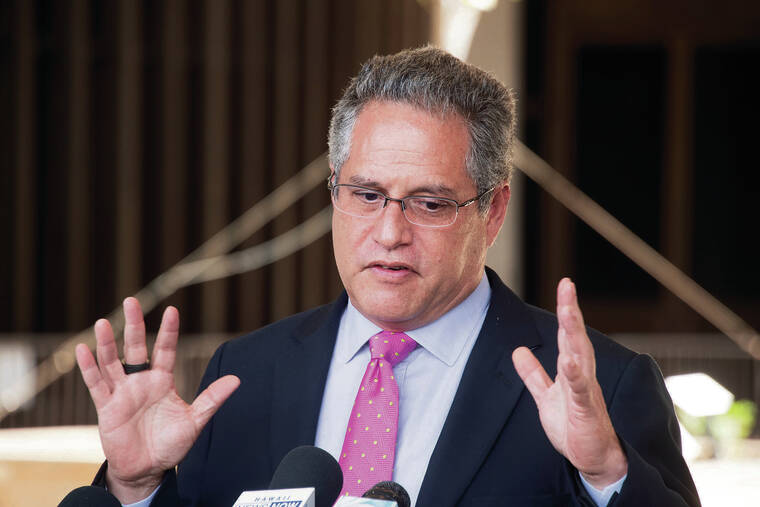The U.S. Department of Justice is asking a federal judge to sentence former state Senate Majority Leader J. Kalani English to 3-1/2 years in prison after he admitted accepting thousands of dollars in cash bribes to manage legislation on behalf of a Honolulu wastewater processing company.
The former Maui lawmaker’s sentencing on Tuesday by senior U.S. District Judge Susan Oki Mollway will be the first time in more than 20 years that a Hawaii elected official has faced sentencing by a federal judge, according to DOJ.
In addition to 42 months in federal prison, DOJ is asking Mollway to impose a $100,000 fine and order English to forfeit $13,305 “in ill- gotten gains.”
English, 55, pleaded guilty Feb. 15 to a single felony count of honest services wire fraud for failing to report the alleged bribes in his electronic legislative gift disclosure report.
English and former state Rep. Ty J.K. Cullen, then vice chairman of the House Committee on Finance, were charged Feb. 9 Opens in a new tab with accepting cash, hotel rooms, dinners and casino chips in exchange for introducing measures, killing legislation and relaying insider information to Honolulu executive and prominent political donor Milton Choy, president of H20 Process Systems, from about 2014 through 2021 Opens in a new tab.
Cullen is scheduled to be sentenced Oct. 20.
Choy, who is referred to as “Person A” in federal court documents, was acting on behalf of federal law enforcement authorities when English “unwittingly initiated the FBI covert relationship with him by reaching out to Person A with a demand for hotel rooms in Las Vegas for English and some of his friends,” according to a sentencing memo to the court authored by Assistant U.S. Attorney Ken Sorenson.
“The sentence must promote a firm respect for the law, and deliver the stern and lasting message that corruption of our elected officials will be punished to the full measure of the law,” wrote Sorenson.
The hotel rooms cost about $1,800, an amount English “happily accepted” before later agreeing to send Choy a private draft report on cesspools that was not available to the public.
“The public’s expectation is that the Majority Leader of the State Senate would abide by his oath of office, conduct himself honestly and above reproach, and render selfless service to the people of Hawaii. When the public learns, as it has in this case, that the Senate Majority leader was lining his pockets with the cash of shadowy special interests, peddling legislative favors in return — and then lying about it on his public financial disclosure forms — there is an even greater collapse in the public’s morale and confidence in their elected officials,” the memo said. “After all, if the leaders of the State Senate are selling out to private interests, then perhaps others are as well.”
English agreed to be interviewed following his arrest, according to the memo, and aided FBI agents in their investigation and met with federal prosecutors. He also accepted full responsibility for his actions, wrote Sorenson.
However, the former lawmaker “failed to provide either the quantum or quality of assistance” sufficient to warrant a downward departure from federal sentencing guidelines, according to the memo.
“English resigned from the Senate a few months after the covert operation that resulted in his arrest. Because English was cooperative, the government had moved to dismiss his pending criminal complaint in order to continue its investigation. Within a few months English appeared on the Senate steps before a full media contingent, and blamed ‘long Covid’ as the reason he was leaving public service,” wrote Sorenson. “In truth, English was leaving public service because he had been busted in a highly sensitive ongoing corruption investigation for taking bribes and betraying his oath of service to the people of Hawaii.”
English’s attorney, Richard Sing, asked the court to sentence him to 30 months in federal prison for accepting $18,305 in cash and hotel rooms from Choy. A federal pre- sentence report to the court recommended a sentence of 37 months.
English took full responsibility for his actions, cooperated with investigators and “has been a working and productive member of society his entire adult life,” Sing wrote in his memo to the court.
A graduate of Kamehameha Schools, English earned a bachelor’s degree from Hawaii Loa College (now Hawaii Pacific University) before finishing a master’s degree in Pacific studies from the University of Hawaii at Manoa.
He speaks English, Hawaiian, Tahitian and Mandarin Chinese, and after college won two terms on the Maui County Council before being elected to the 7th Senate District in 2000, representing East and Upcountry Maui, Molokai, Lanai and Kahoolawe, an office he held for 20 years.
“Many of those who have known and witnessed his kindness, hard work, and dedication to his friends and constituents, continue to support him following his plea of guilty in this matter,” wrote Sing, referring to 25 letters of support from various community members sent to Mollway on English’s behalf.
“The themes articulated in these letters are strikingly similar. Mr. English was a compassionate and dedicated advocate for the rural communities and individuals he represented, as well as a leader and advocate for the issues facing our native Hawaiian population and our pacific island neighbor states. For many years, Mr. English has represented his community and constituents in a compassionate, caring, and effective manner.”
Sing said English contracted COVID-19 in November 2020 and suffers from “long-haul” symptoms that include sleep apnea, memory loss and recall difficulty, lethargy and significant breathing problems. He receives treatments twice a week and is prescribed seven daily medications.
The former lawmaker’s daily life “has been forever altered” by the disease, Sing wrote, and “his conduct during this case has forever stained Mr. English’s career of good works.”
Sing argued that Engish’s career of public service should qualify him for a lighter sentence than called for in federal sentencing guidelines.

